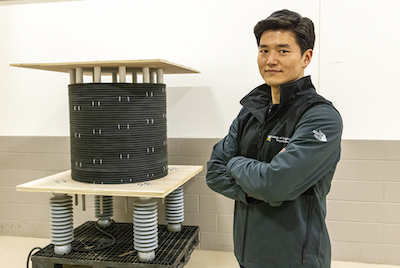
In July, Chanyeop Park, assistant professor, electrical engineering, received a five-year, $762,000 grant from the Office of Naval Research.
Park will research a solution to partial discharge in advanced power semiconductors, events that can harm insulating materials and lead to failure.
“Power semiconductors are at the heart of the global energy transition, including electric vehicles, electric ships, electric planes, solar, and wind energy,” Park said. “However, advanced WBG [wide bandgap] power semiconductors aggravate partial discharge, which erodes electrical insulators at a higher pace than conventional power technologies.”
Park will develop inorganic thin film electrets to prevent partial discharge caused by WBG power semiconductors. The electret films will be designed to survive in the harsh electrical and thermal operating conditions of WBG power semiconductors.
Future power technologies will rely on dielectric integrity
The U.S. Navy is electrifying its fleet and Park’s research will help achieve this goal by securing its dielectric integrity.
“Dielectric integrity refers to a material’s ability to maintain its insulating properties and prevent electricity from flowing through it,” Park says. “It’s crucial to cables, capacitors, printed circuit boards and other electronics.
“It’s also key to safely electrifying transportation systems and modernizing the grid.”
When a material’s dielectric integrity is compromised, he explains, it can lead to electrical leakages, short circuits, and other undesirable effects that can disrupt the normal functioning of electronic devices.”
Park’s recent research includes conducting ONR-funded research that aims to find a way to mitigate partial discharge in power electronics in shipboard power systems at ambient temperatures.
